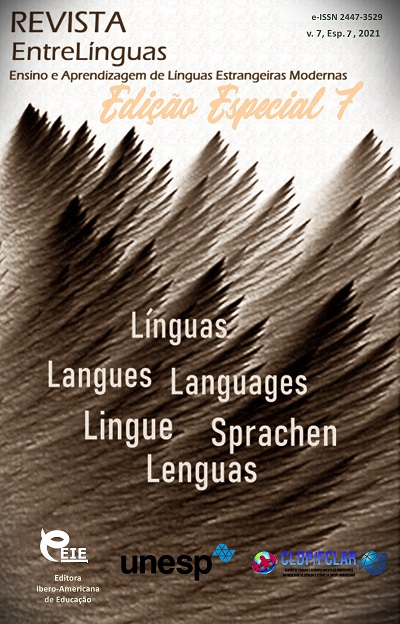Public opinion in tatarstan on language developments and bilingualism
DOI:
https://doi.org/10.29051/el.v7iesp.7.16334Keywords:
Language policy, Public opinion, Russian language, Tatar language, Bilingualism, Russia, TatarstanAbstract
Based on the materials of a representative sociological survey of 2000 residents of the Republic of Tatarstan, a subunit of the Russian Federation, language attitudes and practices are revealed in a multicultural, predominantly bilingual, territory in conditions of the new stage of the linguistic and ethnocultural policy of the federal center. The data was obtained as part of an international scientific project supported by the Volkswagen Foundation. The Republican policy of reviving the Tatar language (the language of the titular nationality of the region and the national minority of Russia) and promoting parity Tatar-Russian bilingualism is evaluated through the prism of public opinion of the population, including Tatars, Russians and representatives of other ethnic groups. The characteristics of similarities and differences in the positions of representatives of the two main ethnic groups are shown. In contrast to the research based on the data, relating only to the predominantly Russian-speaking city of Kazan with an approximately equal number of Tatars and Russians, the subject of this study includes the attitudes of residents of provincial cities and villages of Tatarstan, along with opinions of Kazan residents. The results obtained complement and clarify expert assessments of the success rate of regional language policy and the potential for ethnocultural conflict in Tatarstan.
Downloads
References
CASHABACK, D. Assessing asymmetrical federal design in the Russian federation: a case study of language policy in Tatarstan, in Europe-Asia Studies, 60(2), 249 – 275. 2008.
CHRÍOST, D.M.G. Language, Identity and Conflict: A Comparative Study of Language in Ethnic Conflict in Europe and Eurasia. Routledge. 256 p. 2003.
DROBIZHEVA, L.M., & RYZHOVA, S.V. (Ed.). Positive interethnic relations and prevention of intolerance: the experience of Tatarstan in the all-Russian context: [monograph]. Institute of Sociology of the Russian Academy of Sciences, Moscow, Kazan, St. Petersburg: Nestor-Istoriya, 152 p. 2016.
FILIPOVIĆ, L., & PÜTZ, M. (Eds.) Endangered Languages and Languages in Danger: Issues of Documentation, Policy, and Language Rights. John Benjamins Publishing Company. 413 p. 2016.
GORENBURG, D. Tatar language policies in comparative perspective: why some revivals fail and some succeed, in Ab Imperio, 1, 1 – 27. 2005.
GRANEY, K. Making Russia multicultural. Kazan at its Millennium and beyond, in Problems of Post-Communism, 54(6), 17 – 27. 2007.
Language enforcement in Bashkiria and Tatarstan: “They behave worse than nomads”. EurAsiaDaily.com. November 18. 2019. Retrieved from URL: https://yandex.ru/turbo?text=https%3A%2F%2Feadaily.com%2Fru%2Fnews%2F2019%2F11%2F18%2Fyazykovaya-prinudilovka-v-bashkirii-i-tatarstane-vedut-sebya-huzhe-kochevnikov&promo=navbar&utm_referrer=https%3A%2F%2Fzen.yandex.com.
Path to language consent. Kazanfirst. June 1. 2018. Retrieved from URL: https://kazanfirst.ru/articles/466453?utm_referrer=https%3A%2F%2Fzen.yandex.com.
Putin, V.V. () Speech at the meeting of the Council on interethnic relations in Yoshkar-Ola. Website of the President of Russia. 2017. Retrieved from URL: http://www.kremlin.ru/ev ents/president/news/55109.
SHIRSHOVA, V. Employers-racists: how Kazan and Ufa overtook Moscow and St. Petersburg in tolerance. Real time. June 8. 2018.
SMOKOTIN, V.M. European multilingualism: from nation-states to a multilingual and multicultural Europe. Tomsk: Tomsk University Press. 178 p. 2010.
Downloads
Published
How to Cite
Issue
Section
License

This work is licensed under a Creative Commons Attribution-NonCommercial-ShareAlike 4.0 International License.
Os manuscritos aceitos e publicados são de propriedade da Revista EntreLínguas. Os artigos publicados e as referências citadas na Revista EntreLínguas são de inteira responsabilidade de seus autores.
Transferência de direitos autorais – autorização para publicação
Caso o artigo submetido seja aprovado para publicação, já fica acordado que o(s) autor(es) autoriza(m) a UNESP a reproduzi-lo e publicá-lo na EntreLínguas, entendendo-se os termos “reprodução” e “publicação” conforme definição respectivamente dos incisos VI e I do artigo 5° da Lei 9610/98. O artigo poderá ser acessado pela rede mundial de computadores (Internet), sendo permitidas, a título gratuito, a consulta e a reprodução de exemplar do artigo para uso próprio de quem a consulta, desde que haja a citação ao texto consultado. Essa autorização de publicação 328 EntreLínguas, Araraquara, v. 1, n .2, p. 323-328, jul./dez. 2015 não tem limitação de tempo, ficando a UNESP responsável pela manutenção da identificação do(s) autor(es) do artigo. Os artigos publicados e as referências citadas na Revista EntreLínguas são de inteira responsabilidade de seus autores.











